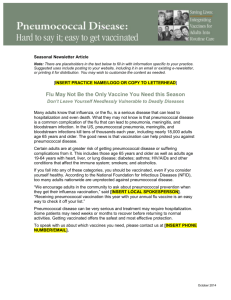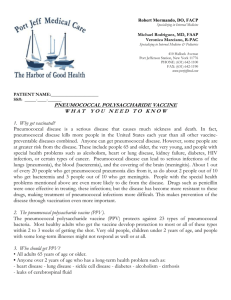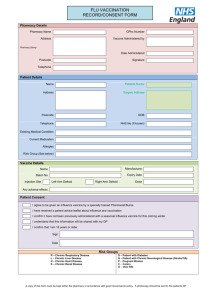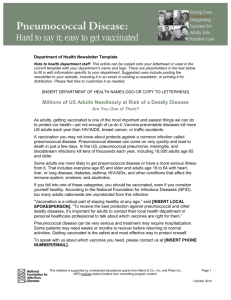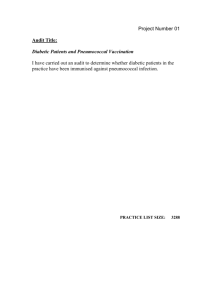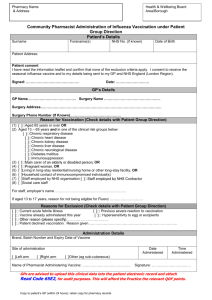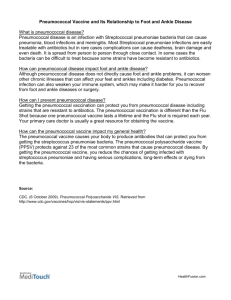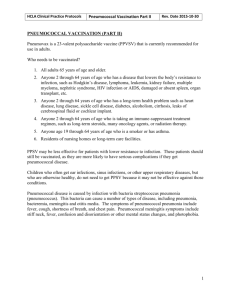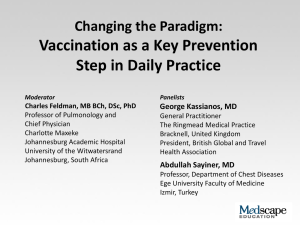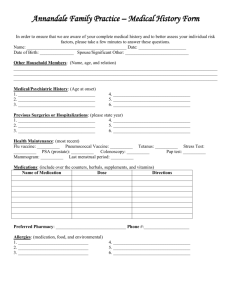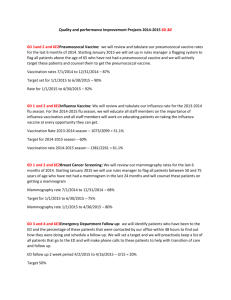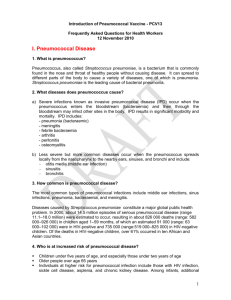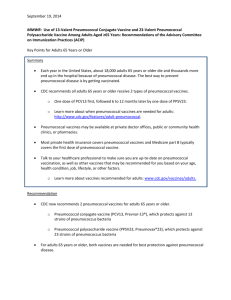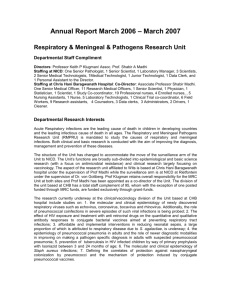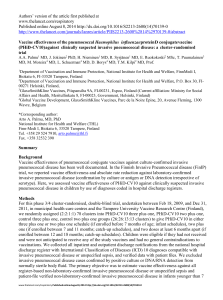Pneumonia vac
advertisement
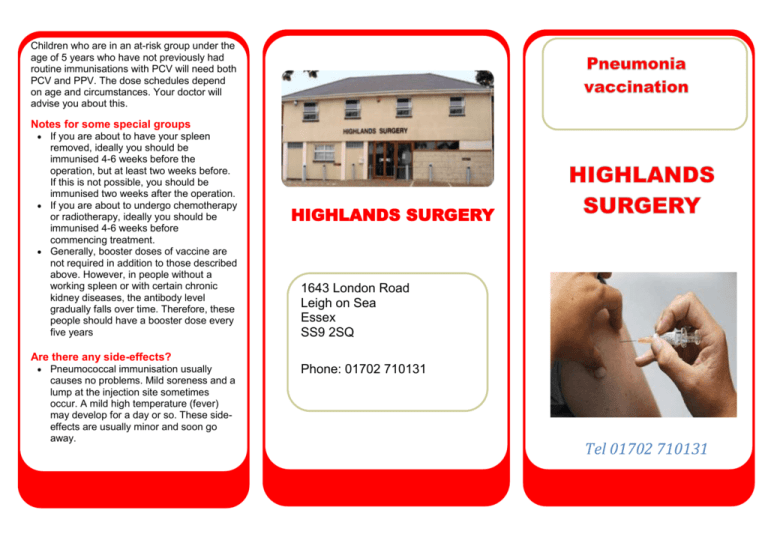
Children who are in an at-risk group under the age of 5 years who have not previously had routine immunisations with PCV will need both PCV and PPV. The dose schedules depend on age and circumstances. Your doctor will advise you about this. Notes for some special groups If you are about to have your spleen removed, ideally you should be immunised 4-6 weeks before the operation, but at least two weeks before. If this is not possible, you should be immunised two weeks after the operation. If you are about to undergo chemotherapy or radiotherapy, ideally you should be immunised 4-6 weeks before commencing treatment. Generally, booster doses of vaccine are not required in addition to those described above. However, in people without a working spleen or with certain chronic kidney diseases, the antibody level gradually falls over time. Therefore, these people should have a booster dose every five years Are there any side-effects? Pneumococcal immunisation usually causes no problems. Mild soreness and a lump at the injection site sometimes occur. A mild high temperature (fever) may develop for a day or so. These sideeffects are usually minor and soon go away. HIGHLANDS SURGERY 1643 London Road Leigh on Sea Essex SS9 2SQ Phone: 01702 710131 Tel 01702 710131 Other at-risk groups Pneumococcal Immunisation Highlands Surgery offer all patients over the age of 65 and those with chronic diseases the pneumonia vaccination. Pneumococcus can cause diseases such as pneumonia, meningitis and blood infections. Children aged under two years should receive the vaccine. You should consider having the vaccine if you are aged over 65 years or have certain diseases of the lung, heart, kidney, liver, and nervous system. Who should be immunised against the pneumococcus? Three groups of people should be immunised: Children People over 65 years Certain other people who are at risk (detailed below). All children Immunisation against pneumococcus is part of the routine childhood immunisation programme. The routine schedule consists of three injections which are normally given at age 2 months, 4 months and between the ages of 12 and 13 months. All older people All people aged 65 or over should be immunised. This consists of a one-off injection. Any person over the age of 2 months in an at-risk group should be immunised. That is, if you: Do not have a spleen or if your spleen does not work properly. Have an ongoing (chronic) serious lung disease. Examples include chronic bronchitis, emphysema, cystic fibrosis and severe asthma (needing regular steroid inhalers or steroid tablets). Have a chronic heart disease. Examples include congenital heart disease, angina, heart failure or if you have ever had a heart attack. Have a serious chronic kidney disease. Examples include nephrotic syndrome, kidney failure or if you have had a kidney transplant. Have a chronic liver disease such as cirrhosis or chronic hepatitis. Have diabetes which requires insulin or tablets to control it. Have a poor immune system. Examples include if you who are receiving chemotherapy or steroid treatment (for more than a month) or if you have human immunodeficiency virus (HIV)/acquired immune deficiency syndrome (AIDS). Have a cochlear implant. Have a cerebrospinal fluid (CSF) shunt (a shunt to drain the fluid that surrounds the brain). Are a welder or are exposed to metal fumes in your job. There is a strong association between welding and the development of pneumococcal disease, particularly pneumonia. Types of vaccine There are two types of vaccine to protect against pneumococcal infection: Pneumococcal conjugate vaccine (PCV). Pneumococcal polysaccharide vaccine (PPV). Both are given by injection. Both vaccines contain several components to protect against several types (strains) of the pneumococcus. They differ in the number of types that they protect against. Also, the PPV does not work very well in children under the age of 2 years. Therefore, the PCV vaccine is given to children under the age of 2 years. The PCV and PPV vaccines do not contain thiomersal; they do not contain live organisms and so cannot cause any of the diseases against which they protect. The vaccines stimulate your body to make antibodies against pneumococcal germs (bacteria). These antibodies protect you from illness should you become infected with pneumococcal bacteria. The vaccines protect against many (but not all) types of pneumococcal bacteria. People aged 65 and over and all other people at any age in any of the at-risk groups listed above are normally given the vaccination just once. It provides lifelong protection against many types of pneumococcus. Children who are in an at-risk group and have previously had their routine immunisations with PCV should also have one injection of PPV as soon as possible after their second birthday (but at least two months after the final dose of PCV).
